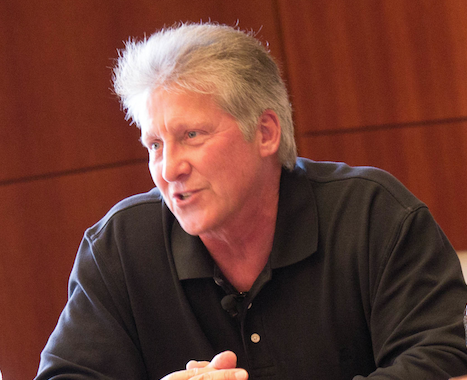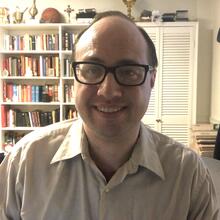Ron Hansen is an American Catholic novelist, essayist and deacon. He is the Gerard Manley Hopkins, S.J. Professor in the Arts and Humanities at Santa Clara University in California, where he teaches fiction and screenwriting. He holds a B.A. in English from Creighton University, an M.F.A. in creative writing from the University of Iowa, and an M.A. in spirituality from Santa Clara. He is also a graduate of Creighton Jesuit Preparatory School in Omaha.
Deacon Hansen has won a number of book awards and literary prizes, including an award in literature from the American Academy and Institute of Arts and Letters. He is the author or editor of more than a dozen works of fiction, including The Assassination of Jesse James by the Coward Robert Ford (later a film) and acclaimed Mariette in Ecstasy. I recently interviewed Deacon Hansen by email about his diaconal ministry.
In what ways are you an “Ignatian deacon”?
I have done both the 19th Annotation and long retreats, so I feel I have been shaped by the Spiritual Exercises as well as by many years of Jesuit education. Inevitably, Ignatian values affect my thinking and my prayer, even in ways I’m not aware of.
Which practices of Ignatian spirituality have most enriched your own life and ministry?
The 30-day retreat at Eastern Point is still a month I hearken back to 10 years later, and the Examen is the prayer I most depend on when short of time or when I’m examining the “affect” of experiences in my life.
RELATED: Ron Hansen talks about his career as a novelist.
What does the word “Ignatian” mean to you?
It connotes an affiliation or accompaniment with members the Society of Jesus, especially for those who have been shaped by the Exercises.
How do you use Ignatian spirituality in your homilies?
My former spiritual director, Leo Rock, S.J., spoke of Saint Ignatius as “a man who came to realize he was loved by God, and that realization transformed him.” Even though our parishioners may pray and regularly attend Mass, it seems to me that some do not feel beloved, they may in fact feel unworthy of God’s love; I try to correct and guide them as I think Ignatius would have.
In what ways do you as a permanent deacon experience Ignatian spirituality differently than a Jesuit?
Well, being a husband and father gives me access to a wide range of experiences that a Jesuit may only relate to indirectly. And the opposite is also true, of course, as Jesuits deal with life in community and with the multiple expectations of the laity. They’re different ways of life with their own joys and sorrows and demands, and Ignatian spirituality will address those areas in very individual ways.
As a novelist, what themes of Ignatian spirituality do you find most enduring?
The meditation on the two standards has influenced most of my novels. In Mariette in Ecstasy you see women striving to follow Christ, while Hitler’s Niece is a meditation on those who sought to ally with the Satanic. In Atticus there’s a prodigal father’s relentless pursuit of his fallen son. A Wild Surge of Guilty Passion illustrates lovers turning away from the call of the heavenly king as Ruth and Judd finally sink to the murder of Ruth’s husband.
What is your approach to giving Ignatian retreats?
I don’t think of myself as a spiritual director, only a listener who accompanies the person in what’s generally a long process, occasionally asking questions to clarify things for myself or the retreatant. I’m fully aware that the Holy Spirit is in charge and I am, at best, an intermediary who perhaps can explain what Ignatius meant and guess at the movements in a person’s soul.
What are some of the graces you’ve experienced in your practice of Ignatian spirituality?
Looking at my life in the First Week [of the Spiritual Exercises], I mentally turned the pages of a scrapbook filled with sins and wrongs and grief. And then I felt God showing me a far fatter scrapbook filled with all the good I had done. In the Second Week I had a profound sense of Jesus always being with me and watching me with love ever since I was a child. The graces come randomly, often without seeking them. There’s just a flash of recognition or a feeling of love and approval that can happen anywhere.
What are some of the challenges you’ve faced?
Any time I’m asked for advice I find myself coming up with an answer, then wondering later if I’d led the person astray. And there’s always the problem of prayer. Saint Paul wrote that we do not know how to pray as we ought, and I identify with that, but he also said the Holy Spirit makes up for our lapses with “groanings.” My own groanings are generally the product of the evil spirit, and my prayer isn’t always a help in that condition.
What would you say to a fellow permanent deacon who expressed curiosity about trying Ignatian spirituality for the first time?
I encourage everyone to try the Spiritual Exercises. Saint Ignatius’s program is a work of psychological genius that can only help one live a fuller, richer life.
Sean Salai, S.J., is a contributing writer at America.







